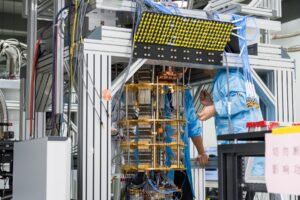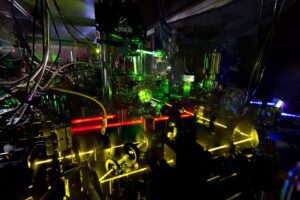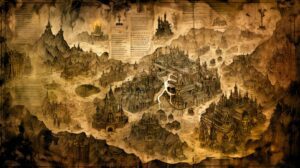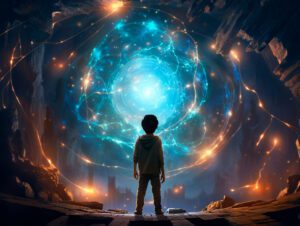 Pin
Pin Image by Freepik
Eugene Paul Wigner died in 1995, his gravestone marking the end of a brilliant but controversial career. The Hungarian-American physicist had spent decades being ridiculed for one particular idea that seemed too strange, too philosophical for serious science. Yet today, as quantum computers process information and modern theories explore consciousness, Wigner’s most mocked concept has become one of the most studied problems in physics.
His “Wigner’s Friend” paradox poses a question that makes even seasoned scientists uncomfortable: What if reality doesn’t fully exist until someone observes it? What if your consciousness isn’t just witnessing the universe, but actually helping to create it? These aren’t just philosophical musings anymore—they’re questions that could reshape how we understand existence itself.
Table of Contents
The Man Who Dared Question Reality
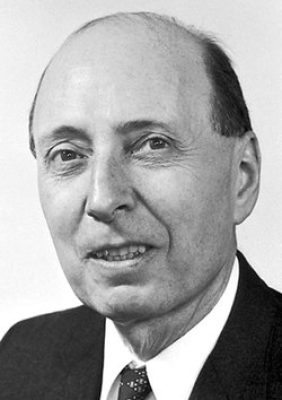 Pin
Pin Eugene Paul Wigner / Image from Wikimedia Commons
Eugene Wigner wasn’t your typical physicist. While his colleagues focused on equations and experiments, he kept asking uncomfortable questions about consciousness and observation. In 1961, he proposed a thought experiment that would haunt quantum mechanics for decades. The scientific community largely dismissed it as philosophical nonsense, too far removed from “real” physics to deserve serious attention.
But Wigner had noticed something troubling in quantum mechanics. The theory worked brilliantly for predicting outcomes, yet it seemed to require conscious observers to make reality “real.” This wasn’t just academic curiosity—it struck at the heart of what we think we know about the world around us. His colleagues preferred to ignore these implications, but Wigner couldn’t let it go.
The Friend Who Breaks Everything
Your friend sits in a sealed lab, measuring whether a particle spins up or down. According to quantum mechanics, until someone observes it, the particle exists in both states simultaneously—a concept called superposition. Your friend looks at the measurement device and sees a definite result: spin up. For them, reality has collapsed into a single outcome.
But here’s where things get weird. You’re standing outside the lab, unable to see what happened inside. From your perspective, both your friend and the particle remain in superposition—your friend exists in a state of having seen both “spin up” and “spin down” simultaneously. Only when you open the lab door does everything collapse into one reality. This creates a mind-bending situation where the same event has different realities depending on who’s observing.
The paradox reveals a fundamental problem: if consciousness causes quantum collapse, then where do we draw the line? Does your friend’s observation count? Or does it require your observation of your friend? This isn’t just philosophical hair-splitting—it points to something profound about the role of awareness in shaping what we call reality.
When Science Catches Up to Madness
Decades passed before physicists began taking Wigner’s ideas seriously. The breakthrough came as quantum technology advanced and scientists needed to understand how observation actually works at the quantum level. Today, three major theories echo Wigner’s original insight, each offering a different solution to his paradox.
John Wheeler’s “Participatory Universe” suggests we’re not just passive observers but active participants in creating reality. QBism (Quantum Bayesianism) goes even further, proposing that conscious agents don’t just observe quantum events—they actively create the probabilities that determine outcomes. Meanwhile, many-worlds interpretation sidesteps the problem by claiming every possibility becomes real somewhere, creating infinite parallel universes.
What’s remarkable is how these modern theories validate Wigner’s core insight: the universe seems fundamentally incomplete without conscious observers. Even quantum computing relies on this observer-dependent logic, using the strange fact that quantum states exist in superposition until measured. The technology powering tomorrow’s computers operates on the very principles that once made Wigner a scientific outcast.
Your Mind as Reality's Co-Creator
This is where Wigner’s theory becomes deeply personal. According to his interpretation, your consciousness isn’t just passively receiving information about the world—it’s actively participating in bringing that world into existence. Every time you make an observation, you’re not simply discovering what was already there. Instead, you’re helping to collapse infinite possibilities into the single reality you experience.
Think about the last time you walked into a room and noticed something new. In Wigner’s view, your act of noticing didn’t just reveal that object—it helped determine which version of reality became real. This doesn’t mean you can wish things into existence, but rather that the universe exists in a state of potential until conscious awareness crystallizes it into actuality. Your attention becomes a creative force, selecting which of countless possible realities becomes the one you inhabit.
This raises profound questions about responsibility and agency. If consciousness helps shape reality, then every thought, every focus of attention, every belief you hold becomes a tool for world-building. The universe isn’t something that simply happens to you—it’s something that happens through you, with your awareness serving as an essential ingredient in the cosmic recipe.
When Reality Glitches in Daily Life
Have you ever had the uncanny feeling that your thoughts somehow influenced what happened next? Maybe you were thinking about an old friend, and they called minutes later. Or perhaps you focused intensely on finding a parking spot, and one opened up exactly where you needed it. While skeptics dismiss these as coincidence, Wigner’s framework suggests something more intriguing might be at play.
If consciousness genuinely participates in shaping reality, then your mental state could influence the probabilities of certain outcomes materializing. This doesn’t mean you have magical powers, but rather that your focused attention might tip the scales in a universe where multiple possibilities exist simultaneously until observation occurs. The key lies in understanding that this influence operates at the quantum level, where the boundary between mind and matter becomes surprisingly fuzzy.
Consider how your expectations often shape your experiences. When you approach a situation with confidence, positive outcomes seem more likely. When you expect problems, they tend to manifest. Traditional psychology explains this through selective attention and confirmation bias, but Wigner’s interpretation adds another layer. Your mental state might actually influence which version of reality crystallizes around you, making your beliefs partially self-fulfilling through the fundamental mechanics of consciousness and observation.
The Universe Before Minds Existed
Here’s where Wigner’s theory faces its biggest challenge: if consciousness brings reality into existence, what was here before minds evolved? This question kept philosophers and physicists awake at night for decades. Did the universe exist for 13.8 billion years in some ghostly, unobserved state until the first conscious being appeared? The implications seem almost absurd, yet they flow logically from the observer-dependent nature of quantum mechanics.
Wigner himself grappled with this puzzle, eventually suggesting that perhaps the universe itself possesses some form of cosmic consciousness. This wasn’t mystical speculation but a serious attempt to solve a real problem in physics. If individual minds help collapse quantum states into definite realities, then maybe there’s a universal mind that has been doing this job since the beginning of time. It’s a breathtaking possibility that transforms our understanding of consciousness from a biological accident into a fundamental feature of existence.
Modern cosmologists have proposed various solutions, including the idea that quantum decoherence can occur without conscious observers through interaction with the environment. Yet none of these alternatives fully address the core mystery: why does the universe seem to require observation to become real? This question pushes us toward considering whether consciousness might be far more fundamental to reality than we ever imagined.
The Switch You Hold in Your Hands
This brings us to perhaps the most empowering aspect of Wigner’s theory. If your consciousness genuinely participates in creating reality, then you’re not a helpless victim of circumstances beyond your control. Instead, you’re holding an invisible switch that can influence which version of reality unfolds around you. The catch is that most people never realize this switch exists, let alone learn how to use it intentionally.
Every time you say “this isn’t real” or “this can’t be happening,” you might be unconsciously wielding this power. But what if you approached challenging situations differently? What if, instead of resisting unwanted realities, you focused your consciousness on the outcomes you prefer? This doesn’t mean ignoring problems or engaging in wishful thinking, but rather understanding that your mental state and focus of attention might genuinely influence which possibilities become actual experiences.
The key lies in recognizing that reality operates more like a collaborative process than a fixed movie playing out regardless of your participation. Your thoughts, beliefs, and expectations aren’t just internal experiences—they’re active ingredients in the ongoing creation of your world. This perspective transforms every moment of conscious awareness into an opportunity to participate more intentionally in shaping the reality you inhabit.
Your Mind as the Architect of Experience
The practical application of Wigner’s insights requires understanding that your mind operates on multiple levels simultaneously. Your conscious thoughts represent just the tip of an enormous iceberg of mental activity that includes beliefs, expectations, and unconscious patterns of attention. All of these elements potentially influence which aspects of quantum possibility collapse into your lived experience.
Start by paying attention to your default mental patterns throughout the day. Notice how often you focus on problems versus solutions, limitations versus possibilities. According to Wigner’s framework, these habitual focuses of attention aren’t neutral—they’re actively participating in selecting which version of reality becomes manifest. When you consistently expect difficulties, you might be unconsciously guiding your consciousness toward realities where those difficulties are more likely to appear.
The practice becomes about conscious curation of your mental state. This doesn’t mean forcing positive thoughts or denying genuine challenges, but rather developing awareness of how your consciousness engages with the field of possibilities around you. Think of it like tuning a radio to different frequencies. Your mental state determines which reality station you’re most likely to receive clearly, while other potential realities fade into static background noise.
The Power You Never Knew You Had
Understanding Wigner’s theory fundamentally changes your relationship with personal agency and influence. You’re not just a tiny speck floating through an indifferent cosmos—you’re an essential participant in an ongoing process of reality creation that has been happening since consciousness first emerged in the universe. This realization can be both thrilling and overwhelming, because it suggests you bear some responsibility for the world you experience.
Consider the moments when you’ve felt completely powerless, trapped by circumstances that seemed entirely outside your control. Wigner’s interpretation suggests that even in those situations, your consciousness was actively engaged in the process of determining which specific version of that difficult reality would manifest. This doesn’t mean you caused your problems or that you can simply think them away, but rather that your mental engagement always plays a role in how situations unfold.
The universe appears to be listening to your consciousness in ways that go far deeper than positive thinking or manifestation techniques. Your awareness acts like a cosmic voting mechanism, casting ballots for which possibilities become actualized. This means that learning to direct your attention consciously isn’t just a self-help strategy—it’s participation in the fundamental process through which reality comes into being. Every moment of conscious awareness becomes an opportunity to influence the trajectory of your experience.
Reality as a Living, Breathing Process
When we step back and consider the full implications of Wigner’s theory, we arrive at a stunning conclusion: reality isn’t a fixed stage upon which life plays out, but rather a dynamic, responsive process that evolves through the participation of conscious observers. The universe emerges moment by moment through countless acts of observation, measurement, and awareness. Each conscious being becomes a co-author in the ongoing story of existence itself.
This perspective dissolves the artificial boundary between inner experience and outer reality. Your thoughts, emotions, and states of consciousness aren’t separate from the physical world—they’re integral components of the process through which that world crystallizes into being. The traditional view of a mechanical universe operating independently of mind gives way to something far more intimate and interactive. Reality becomes less like watching a movie and more like participating in an improvised performance where every actor influences the plot.
This understanding carries profound implications for how we approach life’s challenges and opportunities. When you recognize that your consciousness is actively engaged in the creation of your experience, every moment becomes charged with creative potential. You’re not just surviving in a predetermined world, but participating in its continuous emergence. The responsibility is enormous, but so is the possibility for conscious participation in shaping a reality that reflects your deepest values and aspirations.
Embracing Your Role in Reality's Symphony
The journey through Wigner’s Friend paradox brings us to a revolutionary understanding: we exist within a living cosmos that responds to consciousness itself. This isn’t mystical thinking—it’s cutting-edge physics suggesting that awareness and reality dance together in ways we’re only beginning to comprehend.
As you move forward with this knowledge, remember that you’re not a passive observer drifting through a predetermined universe. You’re an active participant in an ongoing cosmic conversation, where your consciousness contributes to the very fabric of what becomes real. This perspective transforms every moment of awareness into an act of creation, every focus of attention into a vote for which reality emerges.
The implications reach far beyond academic physics. When you understand that your mental state genuinely participates in shaping your experience, you become more intentional about where you direct your consciousness. You begin to see that the quality of your awareness—whether fearful or curious, contracted or expansive—might influence which version of countless possible realities crystallizes around you.
Eugene Wigner’s ridiculed theory has evolved into one of the most profound insights in modern science: the universe appears to be fundamentally incomplete without conscious observers. This suggests that consciousness isn’t just a biological accident, but an essential feature of existence itself. You’re not separate from the cosmos—you’re one of the ways the universe knows itself and brings itself into being.
In practical terms, this means approaching life with deeper appreciation for the creative power of conscious awareness. Every thought you think, every belief you hold, every moment of focused attention becomes a tool for participating in reality’s continuous emergence. You’re holding an invisible switch that influences which possibilities become actual experiences—the question is whether you’ll learn to use it consciously.
FAQs
It’s a thought experiment where a friend observes a quantum particle, collapsing its superposition, but you observing the friend creates another layer of superposition, questioning when reality actually becomes definite.
Not exactly. Your consciousness participates in selecting which of many possible realities becomes actual, but you can’t simply think things into existence—it’s more subtle interaction.
Quantum computers use superposition—particles existing in multiple states until observed—the same principle underlying Wigner’s paradox about when quantum states become definite realities.
This remains hotly debated. Some propose cosmic consciousness, others suggest environmental decoherence, but the question challenges our basic assumptions about reality’s independence.
Understanding that consciousness participates in reality creation can make you more intentional about your mental state, though the effects operate at quantum levels beyond direct control.












